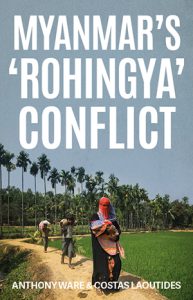Myanmar's 'Rohingya' Conflict

Author(s): Anthony Ware & Costas Laoutides
Publisher: Hurst Publisher
Year of Publication: 2018
Print Length: 224 pages
Genre: Non-Fiction / Political Science
Area: Myanmar, Southeast Asia
Topic: Rohingya, Bigotry, Citizenship, Colonialism & Post-Colonialism, Conflict, Dehumanization, Ethnic Cleansing, Exile, Genocide, History, History & Origin, Identity, Peace, Politics & Power, Refugees & Forced Migration
In the aftermath of the long-predicted crackdown on Myanmar’s Rohingya Muslims, this book offers a nuanced and frank history of their claims to citizenship.
The plight of Myanmar’s Rohingya Muslims has made global headlines in recent years. Hundreds of thousands of Rohingya have fled Myanmar for Bangladesh, amidst serious allegations of genocide, ethnic cleansing and crimes against humanity. The impact on Myanmar’s international standing has been massive. However, much of the commentary so far has been reductionist, flattening complex dynamics into a simple narrative of state oppression of a religious minority.
Exploring this long-running tripartite conflict between the Rohingya, Rakhine and the Burman-led state, this book offers a new analysis of the complexities of the current crisis: the fears and motivations driving it and the competition to control historical representations and collective memory. The authors question these competing narratives, and examine the international dimensions of this intractable conflict, ultimately arguing that the central issue is a contestation over political inclusion and control over governance.
Table of Contents
Maps, Figures, and Tables
Acknowledgments
Foreword—Derek Mitchell, Former US Ambassador to Myanmar
The Vexed Question of Names
Part I: Context
Personal Journeys into this Conflict
1. Complexities, Misconceptions, and Context:
Addressing Misconceptions, Highlighting Complexity
Rakhine State: Geography, History, and Demographics
Approach, Definitions, and Outline
2. Recent Violence and Significance
Three Interconnected Conflicts, Not One
Significance of the Conflict for Myanmar
Part II: Historical Narratives, Representation, and Collective Memory
History, Memory, and the Social Psychology of Conflict
3. The Rohingya ‘Origin’ Narrative
Sources and Their Sociopolitical Context
The Rohingya ‘Origin’ Narrative
4. Rakhine—Burman Narratives: ‘Independence’, ‘Unity’, ‘Infiltration’
Part III: Conflict Analysis
Philosophical Landscape of Conflict Analysis Theory
5. Security Dilemma, Minority Complex, Greed, and Political Economy
A Tripartite Security Dilemma
Double—or Triple—Minority Complex
The Role of the State in the Conflict
Economic Drivers, Resources, and Greed
6. Identity and Territory Grievances in Rakhine State
Identity, Ethnicity, and Conflict
Building Ethnic Hegemony
Ethnic Conflict, Complexity, Fluidity, and Micro-Level Violence
Territory
7. The International Community: Recommendations and Conclusions
So, where to from here?
Notes
Bibliography
Index

Anthony Ware is a Senior Lecturer in Development Studies at Deakin University, Melbourne, and Director of the Australia Myanmar Institute. He specialises in international development in conflict situations, and sociopolitical dynamics of community-led development. His research focuses on humanitarian/international development approaches in conflict-affected situations, with a particular interest in conflict-sensitivity, do no harm, everyday peace, peacebuilding, and countering violent/ hateful extremism via community-led programming.
Source: https://www.deakin.edu.au/about-deakin/people/anthony-ware
More from Anthony Ware in this library, click here.

Costas Laoutides is Senior Lecturer in International Relations at Deakin University, Melbourne. He specialises in separatist conflicts, particularly relationships between negotiated settlements and modes of political accommodation.
Source: https://www.hurstpublishers.com/book/myanmars-rohingya-conflict/
More from Costas Laoutides in this library, click here.
